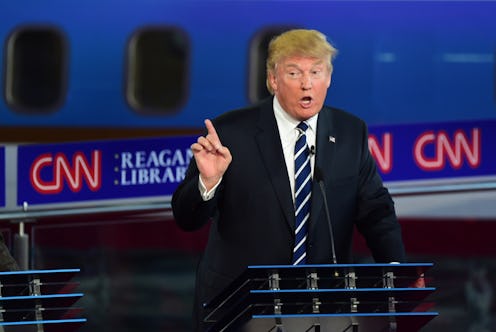News
Ugh, Trump Wants $5 Million For The Next Debate
On Monday, in a completely characteristic but totally un-presidential move, Donald Trump suggested that CNN pay him $5 million to participate in the next Republican primary debate. He claims that he would donate that money to the Wounded Warrior Project or other veterans' organizations. Worthy causes, no doubt, but the problem is that this is not the first time Trump has made such demands, and it's hard to say whether it will be the last.
At a campaign rally in Macon, Georgia, Trump spoke about what he sees as misrepresentation of him in the media. "How about I tell CNN, who doesn't treat me properly … I'm not gonna do the next debate, OK? … I won't do the debate unless they pay me $5 million, all of which goes to Wounded Warriors or goes to vets."
Trump has called on CNN to use debate profits for the good of the country's veterans before. Back in September, he wrote a letter to CNN President Jeff Zucker ahead of the network's first GOP debate, asking him to donate profits from the broadcast to veterans' organizations. At the time, Trump justified his request by inferring that CNN's profits would come largely from the fact that more people would tune in to see him in the debate.
Don't get me wrong; Trump is absolutely right to advocate for support of veterans' organizations. Problems persist at Veterans Affairs healthcare facilities across the country, and veteran homelessness is estimated to be somewhere in the neighborhood of 50,000. The problem is not with the cause that Trump's demand would benefit, but rather with the fact that there was a demand in the first place.
Trump is running for one of the most difficult jobs in the world. In fact, government work is intentionally difficult — our nation's founders wanted there to be some degree of gridlock for the sake of democracy. In a system of government like ours, a leader can't just demand things.
It's not that I think Trump would legitimately demand things as president. He's clearly an intelligent man who is fully capable of understanding how the government works and conforming to the job at hand. But making these sorts of demands has become a trend in his campaign. In October, Trump threatened to boycott CNBC's GOP debate unless it was capped at two hours (again, not an unreasonable request, but a demand nonetheless). CNBC agreed, and the show went on. Then, just last week, Trump demanded an apology from The New York Times after the newspaper suggested that he had mocked one of its reporters.
Trump's affinity for demanding things seems to align with one of his weaknesses: He's running for the highest job in the country with no political experience to show for it. Some may see these actions as forceful shows of power; the type of boldness that our country needs in the face of enemies. (That's probably what Trump is hoping, anyway.) Will that power really translate to government work, though? It doesn't seem likely. After all, if demands worked for presidents, we'd probably have stricter gun control laws by now.
